- Home
- Barry Unsworth
Mooncranker's Gift Page 3
Mooncranker's Gift Read online
Page 3
‘She is very young,’ Mooncranker said, turning towards Farnaby once more, and there was no mistaking it now, Mooncranker was a bit squiffy.
‘Yes, it is true that she is young,’ he repeated in his slow and curiously patient tones.
Night was advancing rapidly. The mosques had surrendered at last their firmness of outline, presenting now a diffused or charred aspect, like charred wood, as though darkness were leaking from them into the sky. Darkness comes to the city of Istanbul, Farnaby observed to himself, with the effect of a flooding from within.
His pleasure at this insight was soon lost in the continuing uneasiness about Mooncranker’s condition, and the lecture in particular. He felt distinctly unwilling to act as confidant in this matter of the runaway secretary, mainly because he sensed in it the prospect of unpalatable revelations, admissions that might oblige him to revise his whole attitude to Mooncranker, and this was the last thing he wanted. It was wrong for people not to be predictable, especially elderly persons like Mooncranker. He himself always tried to do what was expected, when he could discover it. More particularly, however, he felt that he had been granted by Uncle George’s letter the sort of second chance that comes rarely in life, and these vagaries of Mooncranker’s were impeding him in seizing it, which was unfair and unjust. It had reached him so unerringly, the letter, with its precise information as to Mooncranker’s whereabouts, like a message from a higher power which he had been chosen specially to receive and act upon. By patience and cunning he might discover why Mooncranker had sought him out that summer day, had come walking towards him through the shrubbery, paused before him smiling, handed him a small effigy of Christ on the Cross, done up in folds of white bandage. Mysteries that I never thought to penetrate until this letter from Uncle George, this meeting far from home.
He knew too, in another part of his mind, with a sense half-despairing, half-resigned, that there might be nothing really to explain, no case to answer. It had been a random, a gratuitous act, possibly, a mere pimple of evil as it were, squeezed out, forgotten long ago by everyone but himself. Certainly, Mooncranker could not have known, no one could have known, the effect of it on him, the violent clash between pleasure at the gift and subsequent horror at the putrefaction and his feelings of betrayal, utter abandonment, and guilt, not resentment, he had never felt that. Mooncranker it was who by accident or design had set all this in motion, so much was beyond doubt. And he sensed that his chance of learning more depended on preserving the trappings of the past, preserving Mooncranker in his role of stable adult, radio and television personality, visiting lecturer, friend of Uncle George; not a person dishevelled, deserted by his secretary, smelling of drink, disinclined apparently to fulfil his engagements. Mooncranker had to be kept in his place. Though he had not anticipated having to struggle so to keep him in it. And it was to occur to him not much later that the particularly fatiguing nature of this interview, the sense of strain he was already conscious of feeling, came from precisely that unremitting effort to bear Mooncranker up.
‘While I was in the bath,’ Mooncranker was saying, ‘while I was actually having a bath. She packed a suitcase and departed. She did not leave any note. The day before yesterday, in the morning, about nine o’clock, was the last time I heard her voice. She left me at a time when I could ill afford to spare her.’
‘Where would she go, what would she do, in Istanbul?’ Farnaby said.
Mooncranker turned his head slowly towards him. ‘Oh no, you don’t,’ he said with sudden distinctness. ‘You don’t catch me like that.’
‘What do you mean?’ Farnaby was bewildered.
Mooncranker edged away from him along the balcony. All his doubts about his visitor had returned. ‘I know where she is,’ he said. ‘Tomorrow, when I am feeling better, or possibly the day after, I will go and get her back.’ He regretted now having spoken of Miranda to this young man, who was obviously a spy of some kind. After a moment he said, ‘Shall we go inside now? It’s getting chilly isn’t it?’
The room was in semi-darkness but Mooncranker made no move to switch on any lamps. ‘Time is getting on,’ Farnaby said, nervous in the dimness. He peered at Mooncranker who was standing still in the middle of the room. The peacocks on the screen had merged into abstract patterns. On the wall, light still dwelt on Fatih Mehmet’s lean and crafty jaw and on the collar of his kaftan.
‘George Wilson,’ Mooncranker said sorrowfully. ‘The salt of the earth. You could always depend on George Wilson. I may be old fashioned, but I believe in that public-school code. You know where you are with men like that.’
‘Yes,’ Farnaby said. ‘But do they know where they are?’
‘In family life, in professional life – ’ Mooncranker began, then tailed off into inaudibility.
‘It will soon be time for your lecture,’ Farnaby said valiantly.
Mooncranker made a sudden movement, as if startled. ‘Dear boy,’ he said, ‘I wonder if you would be good enough to slip down and get me a packet of cigarettes? I would ask one of the staff, but they might think I was referring to the tickets again.’
‘Of course,’ Farnaby said. He saw now that Mooncranker had no intention of delivering the lecture, and this realization marked the sudden collapse of his efforts to keep the relation between them fixed. ‘What kind?’ he said, peering confusedly through the dimness. If there was to be no lecture what were they both doing there?
‘Yeni Harman, please. Not the filters, the ordinary ones. They are in orange-coloured packets.’
Farnaby made his way rather blunderingly to the door and opening it admitted a shaft of brilliant light from the corridor, which fell in a long stripe across the carpet. Mooncranker stood just beyond this. Farnaby was possessed by an odd sense that there was something which could now be said, something of transfiguring importance that would put them both in the track of the light as it were, change the whole nature of their meeting and conversation, but he could not bring anything to the surface of his mind and turned away wordlessly, stepping out softly into the corridor. He began to close the door quietly behind him, then at the last moment inserted his hand and removed the key from the inside.
Mooncranker stood still, in the wake of this silence, enforcing stillness upon himself; cautiously, voluptuously controlling his impulse to make straight for the bottle, connoisseur even now in his own pain and suspicion. No sound of steps receding along the corridor. Carpet would muffle these of course. Care of the essence, however, care of the absolute essence. He may not have gone yet. He may well be pausing, waiting, just outside in the blinding corridor, waiting for the right moment to slip back in again with some seemingly innocent request. Now perhaps. Yes, time enough now. Light enough for this familiar sequence of actions.
He looked up for a moment, blinking at the dim ceiling, destroying in his mind all the lights and lives above him in that hotel until nothing intervened between him and the night, the soft buoyant darkness above the roof, which did not press upon him, but sought rather to gather, to assume. His upper lip slid over the rim. He tilted the glass but did not drink yet, delaying for the integral pang of self-outrage, not unclamping the lip from its soft adhesion, tilting till the lip itself was immersed. The gin stung his lip.
Far off from the Marmara the hooting of a steamer, sudden maniacal whoop, again silence. He lifted his lip delicately from the rim, and the liquid slid between glass and lip, welled like corrosive saliva, over barriers of teeth, collected to a quantity swallowable, and he swallowed. And swallowed. And he refilled his glass.
2
Getting the cigarettes took longer than might have been expected. There was no kiosk in the immediate vicinity of the hotel, so it was not until some twenty minutes later that Farnaby was emerging from the lift again and making his way down the corridor. He made use of his key to enter, noticing as he did so that the room was now lit by a crimson-shaded table-lamp in the far corner of the room. Mooncranker himself was not immediately visible. However, as he advan
ced into the room he became aware of hasty activity on his far right, and his mind took in Mooncranker’s movements vaguely yet at the same time with a definiteness of impression, in sharp blinking shots like a rapid series of stills, Mooncranker to begin with flat on his back, but this position was antecedent to my entering the room, surely he must already have been in motion at the first sound, assuming a sitting position, swinging his legs sideways, setting them down on the floor, bending a furtive torso, attempting to don shoes, or at any rate this was what he seemed to be doing – the only way on the evidence available to account for the sudden flurry of activity in the region of Mooncranker’s feet, which were, however, still invisible …
Having succeeded in hiding his glass under the divan, Mooncranker looked smilingly at the young man. ‘So there you are,’ he said. His body leaned forward slowly, then slowly righted itself. ‘I was beginning to think you had got lost.’ His voice was unrecognizable, so thick and slurred had it become.
‘Yes, here I am.’ Farnaby had experienced an immediate horror at this change in the other’s voice. It seemed like a sort of bemonstering, the beginning of some grotesque metamorphosis, as though Mooncranker’s face too and his whole form would shortly begin writhing. The old boy has been having a quick one, he said to himself, seeking reassurance in traditional levity.
‘Don’t put any more lights on,’ Mooncranker said, though Farnaby had made no move to do so. With something of an effort Farnaby looked squarely at the former umpire. The statesmanlike wings of hair had fallen over his ears and he was regarding the source of light, the red-shaded table-lamp against the far wall, with a face that seemed still to be bemusedly smiling, though this too might well have been an illusion – Mooncranker’s real expression might have been quite different; the soft pink light was deceiving. The attempt to get his shoes on, if that was what Mooncranker had been doing, had obviously failed, since he was still in his stocking feet, grey woollen socks, and this, together with the dishevelled hair and the impress of his body on the divan, were details that seemed suddenly to Farnaby too intimate, too revealing of Mooncranker’s private existence. ‘Here are your cigarettes,’ he said, taking some steps towards the divan, holding out the packet.
‘No need to bring them here. Put them on the table, dear boy.’
Obediently he turned towards the table. He had been close enough however to see the sudden gleams of moisture on the other’s face, as if keeping him off, preventing him from getting too close, had been a prodigious effort; and at this sight concern invaded him, contended with his reluctance to admit that there was anything wrong or strange about the conversation so far.
‘Perhaps,’ he said, after a momentary hesitation, ‘I’d better ring them up and tell them you are ill.’
Mooncranker nodded, seriously and judiciously. ‘It might, at that, be a good idea, young Farnaby,’ he said, as though conceding a point in argument. And while Farnaby, with a despairing sense of having lost his bearings, was searching out the number in the directory, he was aware all the time of Mooncranker’s voice, hesitant and slurred, expressing some views about tobacco, the virtues of Turkish tobacco, perhaps led to this by thoughts of the cigarettes Farnaby had brought.
‘It is dried out by natural processes,’ he said. ‘It is cured in the sun, you see, young Farnaby.’ At this point he stopped short, his thoughts led off helplessly to rows of persons recently emerged from drink and delirium, sitting in their dressing-gowns on the sheltered terraces of sanatoriums, raising convalescent faces to the life-giving orb. He raised his own face blindly. Cured in the sun. Myself one of the row. Miranda tucking me in. Ah, why did you leave me? Why did you give me no sign? A rush of grief pricked his closed eyes and pained his extended throat. He opened his eyes slightly, saw through a haze of tears Farnaby still puzzling over the directory. Insensitive lout. His feelings changed to cautious anger and malevolence towards this interloper.
‘That telephone directory is private,’ he said, in low tones. The lout did not look up. And now Mooncranker saw that there was another person in the room, a shadowy figure sitting just beyond Farnaby, in a judge’s wig, with a writing pad on his knee.
‘It is surprising,’ he said, trying to enunciate clearly for the benefit of this newcomer, who was obviously taking notes, ‘how conditions of our life today nourish superstition. We abandon the old ones with reluctance and eagerly devise new as the areas of our ignorance extend. And they are extending all the time. The frontiers of ignorance extend with every increase in knowledge. Make a note of that.’ He attempted to peer round Farnaby, but the note-taker had vanished.
‘Ah, here it is,’ Farnaby said.
‘Set against this,’ Mooncranker continued, after some moments of uncertainty, ‘is the great, grand, simple concept of the sun, which we regard as a germ-killing fire.’
‘I’ll phone then, shall I?’ Farnaby said, a faint hope still remaining that Mooncranker might have changed his mind.
At this Mooncranker stopped speaking. The words continued to form however in his mind with a curious sort of laborious persistence, like slow drops of some muddy precipitation, and he was under the impression of uttering them, or at least of their being uttered. Germ-killing fire. Though one might, taking another view, regard the sun as a maggot-breeding agency. So much depends on the point of view. And what is yours, Farnaby? What - is - your - point - of - view? Delicate wrist, supporting the telephone. Small-boned despite your tallness. I see your thin form of the years ago, thin arms sun-freckled emerging from short sleeves. A suggestion about you of haplessness, imperfect coordination. Your face I did not look at, but I saw your long-fingered, scratched hand, taking the Christ from me. And now you have come to take something more. Or possibly repay. Thou out of heaven’s benediction comest to the warm sun …
‘Hello,’ Farnaby said earnestly into the telephone. ‘Is that the British Council? Can I speak to the person responsible for arranging lectures and so on?’
‘Strings and strings of tobacco leaves on these long poles,’ Mooncranker said aloud, observing the respectful manner in which Farnaby addressed the instrument.
‘Confined to his hotel,’ Farnaby said. ‘No, quite impossible, I’m afraid.’
Little clumps of them, green leaves about the size of a single lobe of a chestnut leaf, a well developed specimen of that last, bien entendu,and offered to the sun, which in the course of time shrivels them of all injurious juices. Miranda was always a little slow in the mornings. Her juices took some time to get flowing. She trailed after her still the odours of the night. Sweetly clogged eyes. It took her a long time to wake up. She did not move briskly at that time of day. Yet in the space of half an hour she had packed and gone.
‘He is suffering from nervous exhaustion,’ Farnaby said gravely, as if to a relative of the patient. He listened, agreed, apologized; replacing the receiver finally as gently as restoring an egg to the nest. ‘There are quite a lot of people there already,’ he said, somewhat exhilarated.
‘That argues planning, Farnaby. It was not done on the spur of the moment.’ Mooncranker got up from the divan and moved along the wall towards the adjoining room. Some injurious juice I have left though not I suppose a great deal when measured in cubic centimetres. The sun has shrivelled me at scalp and scrotum. Though it is a process not yet complete.
‘He was awfully fed up when I told him,’ Farnaby said, keeping the other warily in view.
‘Whereas I cannot help feeling,’ Mooncranker said, ‘that factory processes do not expel these carcinomatic substances but keep them trapped in the veins of the leaf. I cannot rid myself of this feeling, Farnaby, struggle as I may. Excuse me one moment.’
He padded across the remaining three yards of carpet with a surprising burst of speed, and disappeared into the next room, not quite succeeding in closing the door behind him. Farnaby, still standing beside the telephone, heard after some moments the unmistakable choke and gurgle of a person vomiting, followed soon after by the flushing of t
he lavatory. Mooncranker reappeared, white and smiling, more collected in manner and speech.
‘There is something that has been exercising my mind,’ he said. ‘Ever since I arrived at this hotel. It is in the next room.’
Farnaby looked with simple curiosity at Mooncranker, possessed by the strangeness of knowing that only minutes before that body had been convulsing itself, poised above the lavatory-pan for the next choking spasm; and was now in only precarious control, upright, surmounted by a face that had not forgotten the need for smiling, albeit in ghastly bedewed fashion. ‘In the next room,’ he repeated, with a sense that anything at all could be revealed. He suddenly felt terribly tired. How long had he been there? Certainly not two hours yet. In that time he had struggled to keep Mooncranker in his place, the Mooncranker of memory and tradition, with direct authority from Uncle George, empowered to divide up time that might otherwise have been as undifferentiated as that in Eden, with his loves and deuces, vans in and out. He had seemed in his white clothes to be the perpetual arbiter. Time and the application of rule will settle everything, he had seemed to say. Time and rule will bring all sets to a conclusion, there will be winners and losers. Time will expose your illusions, rot your dreams. Rot your Christ on his pathetic crucifix of lathe. When he handed it over he smiled, because he knew this. His head turned through an angle of possibly ninety degrees, as if scanning to either side.

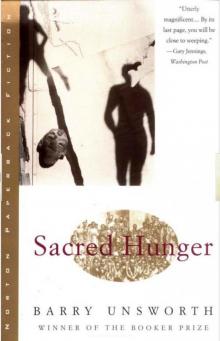 Sacred Hunger
Sacred Hunger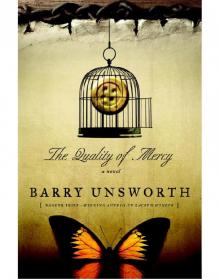 The Quality of Mercy: A Novel
The Quality of Mercy: A Novel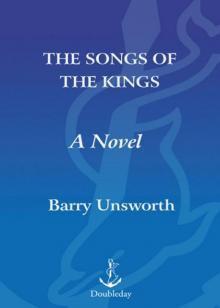 The Songs of the Kings: A Novel
The Songs of the Kings: A Novel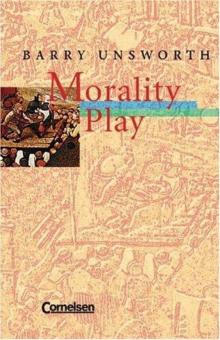 Morality Play. Mit Materialien. (Lernmaterialien)
Morality Play. Mit Materialien. (Lernmaterialien)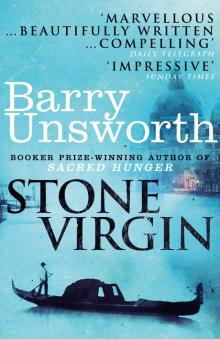 Stone Virgin
Stone Virgin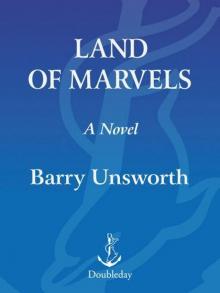 Land of Marvels
Land of Marvels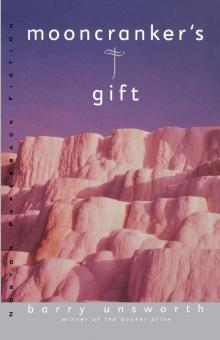 Mooncranker's Gift
Mooncranker's Gift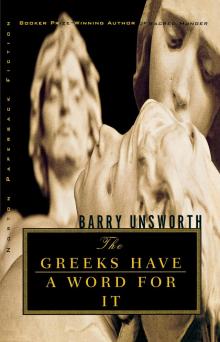 The Greeks Have a Word for It
The Greeks Have a Word for It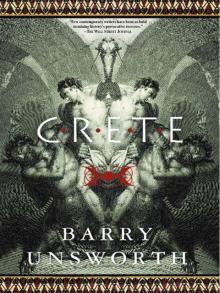 Crete
Crete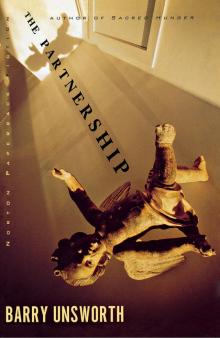 The Partnership
The Partnership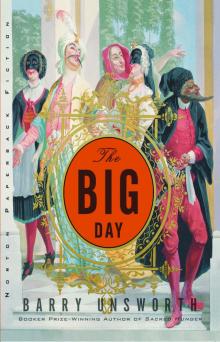 The Big Day
The Big Day The Hide
The Hide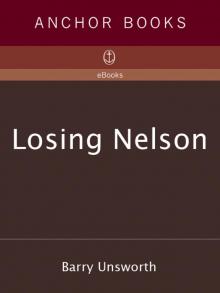 Losing Nelson
Losing Nelson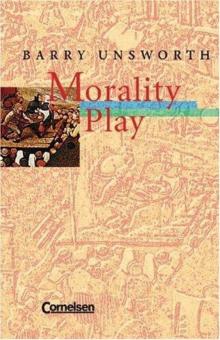 Morality Play
Morality Play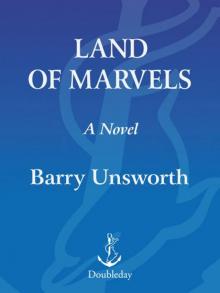 Land of Marvels: A Novel
Land of Marvels: A Novel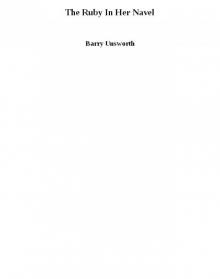 The Ruby In Her Navel
The Ruby In Her Navel